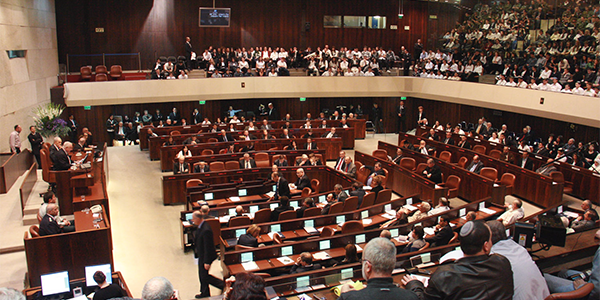Does changing electoral rules affect legislators’ productivity?
There have been numerous reforms to the electoral rules and candidate selection processes for the Israel parliament (Knesset) in recent years, making it an interesting case study for testing the hypothesis that such changes affect legislators’ productivity. Using a model that acknowledges there are many facets to legislators’ roles Osnat Akirav demonstrates that legislators’ productivity is affected changes to these rules – but that this does not in turn make it more likely that they will be re-elected.

Knesset. Picture: Itzik Edri via a (CC BY 2.5) licence/Wikimedia commons
Mayhew (1974) argued that most legislators are motivated by a desire to be re-elected, and that desire determines the utility of their legislative activity towards this end. In recent research I demonstrate that in Israel electoral reforms and the candidate selection process affects legislators’ productivity, but their activity does not affect the probability of them being re-elected.
Israel has a unicameral parliament whose members are elected by a closed-list system of proportional representation with the entire country serving as one constituency. In the first 30 years of its history, Israeli politics was dominated by the Mapai Party (later the Labor Party). After Labor’s defeat in 1977, the Israeli party system fragmented and chronic policy stalemates developed.
Two successive reforms sought to remedy the problems the Israeli political system faced. The first, passed in 1992, introduced the direct election of the prime minister. In this reform the formal requirement for an investiture vote was removed, and a successful no-confidence vote needed an absolute majority of members of parliament. Seats were allocated in a proportional way, just as before the direct election of the prime minister. The second reform required that parties earn 1.5% of the vote to receive a seat in parliament.
These reforms did not manage to address the problems they were intended to fix, and in 2001 the parliament restored most of the old system, with two additions. First, a semi-constructive no-confidence vote that was amended to a constructive no-confidence vote in 2014 was now required. In 2004 and 2014 the threshold for receiving a seat in parliament was raised to 2% and 3.25% respectively.
The frequent changes both in the electoral system and in the candidate selection methods have created an unstable political environment. Members of the Knesset (MKs) must therefore adjust and cope with the dynamics of change. Have these changes affected their behaviour? And subsequently does the level of MKs’ productivity increase their probability of being re-elected?
Legislators’ productivity
In their daily parliamentary life legislators need to cope with time restrictions, multiple and simultaneous demands, voters’ expectations and their own agenda. To reflect these various factors, I created a theoretical model that acknowledges the multi-dimensional, overlapping and multi-tasking nature of the legislators’ roles. Israel as a microcosm for both reforms in the electoral system and changes in candidate selections provides a useful environment for testing the hypothesis that candidate selection methods affect legislators’ productivity.
To test this model, I utilised data from the 14th (1996–99), 16th (2003–6) and 19th (2013–15) Knesset terms, which span the period during which changes were made to candidate selections (including, for example, open primaries for candidate selection used by some parties for the first time in the 14th Knesset), as well as the reforms noted above. The findings showed that the 19th Knesset was more productive in all three stages of legislation. However, legislators used one-minute speeches more often in the 16th Knesset than the 19th Knesset. Furthermore, the 16th Knesset was more productive than the 19th and the 14th Knesset with regard to ordinary motions for the agenda and more productive than the 19th Knesset with regard to oral parliamentary questions. I found that Knesset term, party size, candidate selection method, gender, nationality, party affiliation and seniority are the main explanations for legislators’ productivity. The first most influential factor is Knesset term; the use of parliamentary tools differed in all of them. Second, MKs from small parties were more productive than MKs from larger parties. Third, MKs selected by the party elite or a party agency were more productive with regard to their use of oral and written parliamentary questions, while MKs selected by party members were more productive with regard to all three stages of legislation. Fourth, female MKs presented fewer bills and urgent motions for the agenda compared to male MKs. Fifth, Arab MKs made more one-minute speeches than Jewish MKs but were less productive with regard to obtaining preliminary hearings and passing legislation. Sixth, being a member of the opposition or coalition affected the use of two tools: oral parliamentary questions and passing legislation. Finally, junior MKs made more use of them than senior MKs. Will combining the use of all of the tools into one productivity scale provide similar results?
The data showed that the MKs’ productivity level was higher in the 19th Knesset than the 14th and 16th Knesset terms. There is an increase in the average and median productivity level from the 14th Knesset to the 19th Knesset, and an increase in the variance in the general tendency. Thus, the MKs were more productive but also demonstrated more variance. What factors can explain both the increase in the productivity level and the increase in its variance? One explanation is the role of the party. Some parties select their MKs using a party agency while in other parties it is the party elite or the party members who choose the MKs. Each candidate selection method creates different incentives to use parliamentary tools, and hence to be productive. A second explanation is the changes that occurred in the rules of the Israeli political system. All of these changes tried to give more power to the larger parties or to a specific leader, but the strength and ability of the individual MKs to fulfill their parliamentary roles was neglected. Therefore, they must utilise all of the tools available to them.
My final test involved analysing the independent variable separately in each Knesset term using the dependent variable of the legislators’ productivity as the one and only measurement of it. Female MKs were less productive than male MKs, opposition MKs were more productive than coalition MKs, MKs from small parties were more productive than MKs from large parties. Finally, senior MKs were more productive than junior MKs. MKs selected by a party agency were more productive than MKs selected by the party elite or party members.
Contrary to Mayhew’s argument, however, I found that an increase in productivity level does not increase the likelihood of an Israeli legislator being re-elected to the next parliament. Hence, the results confirm that the candidate selection process affects legislators’ productivity but their productivity does not in turn affect the likelihood of them being re-elected.
This article represents the views of the author, and not those of Democratic Audit. It draws on the author’s article ‘Electoral Rules and Legislators’ Productivity’, published in Parliamentary Affairs.
About the author
 Osnat Akirav is a senior lecturer in Political Science at the Western Galilee College, Israel and the head of the department of political science at the Western Galilee College. She holds a PhD from the Hebrew University in Jerusalem and postdoc from UCSD. In 2016 she was a visiting scholar at Stanford university. Her specialization is in legislative studies, setting the agenda, candidate selection methods, local government, gender and politics, minorities and politics, research methods and Israeli political system. She has numerous publications on the representative behavior in local government and in parliaments. She served 10 years as local council representative. In 2010 and in 2015 she received a prize for outstanding teaching in political science from the American Political Science Association and in 2012 she received Edmond Safra award for outstanding achievement and excellence. In 2012 and 2016 she received a prize for best article from the Israeli Political Science Association. In 2015 and 2018 She received a prize for excellent researcher from the Western Galilee College.
Osnat Akirav is a senior lecturer in Political Science at the Western Galilee College, Israel and the head of the department of political science at the Western Galilee College. She holds a PhD from the Hebrew University in Jerusalem and postdoc from UCSD. In 2016 she was a visiting scholar at Stanford university. Her specialization is in legislative studies, setting the agenda, candidate selection methods, local government, gender and politics, minorities and politics, research methods and Israeli political system. She has numerous publications on the representative behavior in local government and in parliaments. She served 10 years as local council representative. In 2010 and in 2015 she received a prize for outstanding teaching in political science from the American Political Science Association and in 2012 she received Edmond Safra award for outstanding achievement and excellence. In 2012 and 2016 she received a prize for best article from the Israeli Political Science Association. In 2015 and 2018 She received a prize for excellent researcher from the Western Galilee College.





 Democratic Audit's core funding is provided by the Joseph Rowntree Charitable Trust. Additional funding is provided by the London School of Economics.
Democratic Audit's core funding is provided by the Joseph Rowntree Charitable Trust. Additional funding is provided by the London School of Economics.
Productivity of a legislator is a disaster. Excess legislation is the last thing democracy needs. Freedom is a central value in which the best thing is to let things happen on their own. The least legislative – the better.